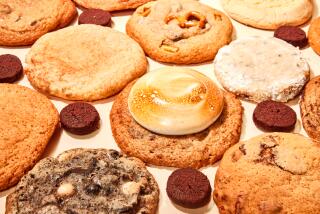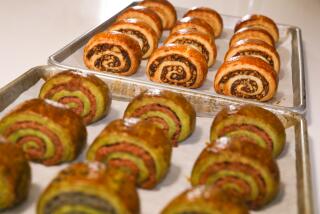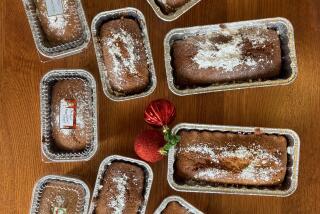So wild, so delicate
ONE: Who knew both rosemary and thyme were so distinctly fantastic for baking? And two: Who knew rosemary and thyme were so easily interchangeable in all those cookies, crisps, cobblers, even flan?
Put a batch of rosemary or thyme cookies in the oven, and the wintry herbal-floral aromas that fill the kitchen are a crisscross of butter, sugar and a toasty bouquet garni. Rosemary, with hints of pine and lemon, and slightly minty thyme (they’re both members of the mint family) are known for pulling up the flavors of roasted meat or fish; accenting the saltiness in sauces; and defining the vegetable-garden tastes of tomatoes, peppers and onions.
But they work just as fabulously in desserts: creamy custards or panna cotta; buttery cookies; and pies, crisps and cobblers made with fall fruit such as apples and pears.
Like lemon zest or ginger used in baking, rosemary and thyme focus the elements in fruit that aren’t sweet while tempering the sugars. But the two herbs add their own pungent, piney nuances.
Add finely chopped, fresh rosemary or thyme leaves to rolled-out butter cookies, and the fragrant herbs play off vanilla bean seeds and fleur de sel in the batter. The herb-flecked cookies are simultaneously savory and sweet.
Despite the strong essential oils in rosemary leaves, you can use the same amount of either rosemary or thyme in the cookies. Same with cobblers and crisps. A pear crisp gets a butter-flour-brown sugar topping with a tiny bit of ground ginger and a couple of spoonfuls of either fresh chopped rosemary or thyme leaves. The herbs scent the pears in the crisp, mingling with the vanilla and lemon juice that are mixed in with the fruit.
For a creamy, luxurious flan, bruised sprigs of the herbs (with the leaves and stems) are infused in a milk and cream mixture for 1 hour, and the flavor of rosemary becomes much stronger than the flavor of thyme. So, in this case, you would use more thyme than rosemary in the recipe. Once the flan is baked, it’s allowed to cool, then refrigerated overnight, and the flavor of the herb becomes a little stronger.
The flan’s layer of unctuous, sweet caramel is especially delicious with the creamy, herbal custard. Now you know.
--
donna.deane@latimes.com
--
Rosemary/thyme cookies
Total time: 40 minutes, plus chilling time
Servings: Makes about 2 dozen cookies
Note: From test kitchen director Donna Deane.
1 3/4 cup flour
3/4 teaspoon baking powder
1 teaspoon fleur de sel
1/2 cup (1 stick) butter, softened
1/2 vanilla bean, split lengthwise
2/3 cup sugar
1 1/2 tablespoons finely chopped rosemary or thyme, plus additional for sprinkling
1 egg
1 tablespoon milk
1. Heat the oven to 375 degrees. Sift together the flour and baking powder in a medium bowl. Stir in the fleur de sel.
2. Cream the butter in the bowl of a stand mixer fitted with the paddle attachment (or in a medium bowl using a hand mixer). With the tip of a knife, scrape the vanilla bean seeds into the butter. Continue to beat until blended. Add the sugar and mix until light and fluffy, making sure to scrape down the sides of the bowl. Beat in the rosemary or thyme, then beat in the egg just until blended.
3. Beat in the flour mixture just until the dough is well-mixed. Remove the dough from the bowl and flatten into a disk. Wrap the dough in plastic wrap, and chill it for 15 minutes.
4. Remove the plastic wrap and roll the dough out on a lightly floured surface to one-fourth-inch thick. Cut out cookies into 2-inch squares, rounds or triangles. Place them on a buttered cookie sheet. Lightly brush the tops of each cookie with milk, then sprinkle with a little rosemary or thyme. Place the cookie sheet in the refrigerator to allow the cookies to chill an additional 15 minutes.
5. Bake the cookies for 9 to 12 minutes, until the cookies have faint coloring around the edges. Remove the tray from the oven, and transfer the cookies to a wire rack to cool.
Each cookie: 92 calories; 1 gram protein; 13 grams carbohydrates; 0 grams fiber; 4 grams fat; 2 grams saturated fat; 19 mg. cholesterol; 115 mg. sodium.
--
Rosemary/thyme pear crisp
Total time: 1 hour
Servings: 6 to 9
Note: From Donna Deane.
6 ripe Bartlett pears
1 tablespoon lemon juice
3/4 cup plus 2 tablespoons packed light brown sugar, divided
1 cup flour plus 2 tablespoons, divided
1 vanilla bean, split
3/4 teaspoon baking powder
1/2 teaspoon ground ginger
1/2 teaspoon kosher salt
2 tablespoons finely chopped rosemary or thyme
1/2 cup (1 stick) cold butter, cut into 1-inch pieces
1. Heat the oven to 375 degrees. Quarter, core and peel the pears. Spinkling the pears with lemon juice as you go to prevent browning, cut each quarter crosswise into one-fourth-inch-thick slices. You should have about 6 cups of sliced pears.
2. Once you have sliced all the pears, add 2 tablespoons of the brown sugar and 2 tablespoons of the flour to the pears, tossing to coat. With the tip of a knife, scrape the seeds from the vanilla bean onto the pears and toss to coat evenly. Set them aside while you prepare the topping.
3. Combine the remaining three-fourths cup brown sugar, 1 cup flour, baking powder, ground ginger, kosher salt and rosemary or thyme. Add the butter and work into the dry ingredients until it is crumbly.
4. Spoon the pear mixture into a 9-inch square baking dish. Sprinkle crumb topping evenly over the top of the fruit. Bake 35 to 40 minutes, until bubbly and lightly browned on top. Remove from the oven and let stand until warm before serving.
Each of 9 servings: 293 calories; 2 grams protein; 50 grams carbohydrates; 4 grams fiber; 10 grams fat; 6 grams saturated fat; 27 mg. cholesterol; 114 mg. sodium.
--
Rosemary/thyme flan
Total time: 1 hour, 45 minutes, plus overnight chilling
Servings: 8
Note: From Donna Deane.
1 1/2 cups milk
1 1/2 cups heavy cream
1 1/3 cups sugar, divided
3 sprigs rosemary about 5 to 6 inches long or a small handful of thyme sprigs (about half of a 2/3 -ounce package)
3 egg yolks
3 eggs
1. In a medium saucepan, combine the milk, the cream and two-thirds cup of the sugar. Bruise the sprigs of rosemary or thyme with a mallet to lightly crush them. Add the herbs to the milk mixture in the saucepan, and bring to a simmer over medium heat. Remove from the heat, cover and let the infused milk steep for 1 hour. Strain the mixture through a cheesecloth-lined strainer. Lift the cheesecloth out of the strainer, and squeeze out any remaining liquid from the herbs, then discard them.
2. Heat the oven to 350 degrees. Place the remaining two-thirds cup sugar into a heavy-bottomed skillet and heat over medium heat. Shake the pan so that the sugar is evenly distributed in the bottom of the pan. Tilt and move the pan around on the burner to prevent hot spots, and heat until the sugar caramelizes to an amber color, 5 to 6 minutes.
3. Pour the caramelized sugar evenly into the bottom of a 2-quart, round, glass baking dish. If necessary, tilt the baking dish back and forth so the bottom is evenly coated with the caramel. Allow the caramel to cool.
4. Whisk together the egg yolks and eggs just until blended. Whisk the infused milk mixture into the eggs and strain.
5. Put the caramel-lined baking dish into a deep, 13-by-9-inch pan and pour the egg custard mixture into the baking dish. Pour in enough hot water to come halfway up the sides of the pan to the level of the custard. Carefully put it in the oven.
6. Bake until the flan is set and the center has a slight jiggle, about 1 hour to 1 hour, 10 minutes. Remove from the oven and let cool, then cover and chill overnight.
7. When you’re ready to serve, loosen the sides of the flan with the tip of a knife or a small spatula and invert the flan onto a large serving plate. If you have a problem removing the flan, dip the baking dish into a pan of hot water to loosen the bottom and sides.
Each serving: 358 calories; 6 grams protein; 37 grams carbohydrates; 0 grams fiber; 22 grams fat; 12 grams saturated fat; 222 mg. cholesterol; 65 mg. sodium.



